Would stripping banks of their power to create money cause a shortage of money, high unemployment and an economic decline? (Report)

Some economists and commentators have claimed that Positive Money’s proposals for a sovereign money system, in which banks are not permitted to create money, would leave the economy with a money and credit supply that is rigid, inflexible and unresponsive to the needs of the wider economy. According to one critic, such a system would result in “a shortage of money, high unemployment and low economic activity”.
In this report we are responding to those criticisms, by laying out the range of policy options that would ensure a sovereign money system (in which only the Bank of England can create money) would be more stable and responsive to the needs of the economy than the current system.

In the current system, new money is created every time a bank issues a loan, and is destroyed whenever part of the principal is repaid. The resulting ‘flexibility’ in the supply of money and credit has translated not into greater economic growth, but into speculative bubbles in property and financial assets and a financial crisis. After the crisis, this flexibility lead to a contraction in the supply of credit to the real economy, which the Bank of England attempted to offset through Quantitative Easing.
Clearly it would be a mistake to assume that greater flexibility is always better; there is likely to be some optimal level. This paper does not attempt to determine what that optimal level of flexibility would be. Instead, we want to show that a sovereign money system is not synonymous with an inflexible system.
The confusion arises because critics who argue that a sovereign money system is inherently inflexible conflate two separate policy choices:
1) Which entity should be authorised to create new money: an agency of the state, or private banks?
2) What criteria or process should trigger the creation of new money?
Crucially, the flexibility of money supply depends not on who creates the money, but on which criteria trigger the creation of new money. By changing the criteria that trigger the creation of new money, we can choose between monetary systems that range from being completely inflexible through to extremely flexible (for example, one in which money supply is determined entirely by the demand for loans). In plain English, the inflexible extreme could be characterised as “The money supply is £2 trillion and so it will always be”, whilst one flexible extreme would be “Money will be created whenever there’s someone willing to borrow it”.
It is therefore a logical error to assume that transferring the power to create money from banks to the state will automatically lead to a less flexible (or ‘responsive’) money supply. In fact, if certain policy choices are made, a sovereign money system may be even more flexible than the existing monetary system.
The paper is available here.